
Hometown: Drexel Hill, Pennsylvania
Undergraduate: University of Delaware
Student's next step: Veterinary Program, Colorado State University
How did you first learn about Drexel's MLAS program?
I learned of the MLAS program while working as a research technician in undergrad. One of my coworkers was an aspiring veterinarian and she had just started the program. We constantly talked about the benefits of attending a graduate program prior to veterinary school, and it was ultimately her influence and the encouragement of my boss that led me to decide that MLAS would be a perfect avenue for me to take so that I would feel better prepared entering veterinary school.
Why did you choose to apply to Drexel's program?
After applying to veterinary school once, I spoke with admissions counselors about how best to improve my application. It was evident after those conversations that my primary goal should be to show that I can handle the rigor of a graduate program. What interested me in the MLAS program specifically was that I would have the opportunity to gain more experience in the world of laboratory animal science while also taking intensive biomedical courses that allowed me to prove myself as a student. I also loved that Drexel’s program would show me multiple fields within the veterinary profession, while allowing me to explore career options such as regulatory, managerial, and investigative roles in research that would still involve working with animals.
What are you doing now after graduation?
I am currently a veterinary student at Colorado State University!
When did you know you wanted to become a veterinarian?
Though I have wanted to be a veterinarian since I was 8 years old, it wasn’t until college that I decided I wanted to work in biomedical research and pursue a specialty. After my first job working in a comparative medicine lab, I was immediately attracted to the idea of working with a variety of animals in a field that allowed me to still have a manageable work/life balance!
Can you tell me how me how the program helped prepare you for vet school?
I feel so much more prepared for the volume of work that accompanies veterinary school. The MLAS program has given me the opportunity to develop my study methods while taking challenging new courses that I may not have had the exposure to during my time as an undergraduate. Since I have taken courses like graduate physiology, pharmacology and medical microbiology, I have a strong foundation of knowledge that I am able to build on during my four years of veterinary school.
What area of veterinary medicine do you want to practice when you graduate?
While I am generally keeping an open mind, I plan on pursuing a residency and board certification in laboratory animal medicine! I ultimately want to work with a variety of species in a capacity that will positively impact a large population of humans and animals. MLAS and my past research experience has shown me that laboratory animal medicine is the best option for me to achieve those goals.
Looking back, what was the best part of the program?
From a personal standpoint, I loved being able to connect with my classmates and faculty members who shared the same passion and enthusiasm toward biomedical research and working with animals. My two years in MLAS helped me build a network of people who can help me grow and reach my fullest potential.
Academically, the best part of this program is that it has shown me (and veterinary schools) what I can do when I push myself by taking difficult courses and managing a work/life balance.
What was your relationship like with other students in the program?
As a face-to-face student with seven other classmates, we were all very close. We helped each other with questions about class material, and we were able to form strong bonds that I hope will last for a very long time. I still talk to most of my classmates!
What was your relationship like with the program’s faculty members?
I have always felt comfortable when speaking with both the program coordinators and the individual instructors. Everyone at Drexel wants us to succeed and achieve our goals. The faculty truly makes an effort to get to know the students on a personal level, so much so that three out of my six letters of recommendation for vet school came from Drexel. Dr. Huneke and Erin are wonderful resources not only for those who want to apply to veterinary school, but also for students who want to have a career in industry!
Do you have any advice for incoming students who are considering the MLAS program with the goal of attending vet school?
I fully believe that my journey to veterinary school would have been a lot more challenging had it not been for the MLAS program and the mentors I gained along the way. My biggest piece of advice would be to use your time at Drexel to challenge yourself and to get involved in extracurriculars that interest you. If your ultimate goal is to become a veterinarian, I would also recommend pursuing the pre-veterinary minor because the classes like graduate physiology, pharmacology and genetics will come back during veterinary school!
Also, lean on your faculty for advice and resources. Erin and Dr. Huneke have been indispensable! They are committed to helping students develop a plan for themselves and making connections with people in lab animal science.